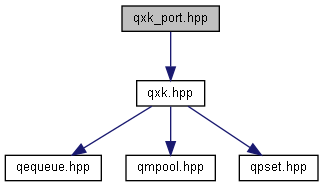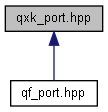QXK/C++ port example, Generic C++ compiler. More...
#include "qxk.hpp"

Go to the source code of this file.
Macros | |
| #define | QXK_ISR_CONTEXT_() (getSR() != 0U) |
| determination if the code executes in the ISR context (used internally in QXK only) More... | |
| #define | QXK_CONTEXT_SWITCH_() (trigSWI()) |
| trigger context switch (used internally in QXK only) More... | |
| #define | QXK_ON_CONTEXT_SW 1 |
| activate the context-switch callback More... | |
| #define | QXK_ISR_ENTRY() |
| Define the ISR entry sequence, if the compiler supports writing interrupts in C++. More... | |
| #define | QXK_ISR_EXIT() |
| Define the ISR exit sequence, if the compiler supports writing interrupts in C++. More... | |
Functions | |
| std::uint32_t | getSR (void) |
| void | trigSWI (void) |
QXK/C++ port example, Generic C++ compiler.
Definition in file qxk_port.hpp.
| #define QXK_ISR_CONTEXT_ | ( | ) | (getSR() != 0U) |
determination if the code executes in the ISR context (used internally in QXK only)
Definition at line 47 of file qxk_port.hpp.
| #define QXK_CONTEXT_SWITCH_ | ( | ) | (trigSWI()) |
trigger context switch (used internally in QXK only)
Definition at line 50 of file qxk_port.hpp.
| #define QXK_ON_CONTEXT_SW 1 |
activate the context-switch callback
Definition at line 54 of file qxk_port.hpp.
| #define QXK_ISR_ENTRY | ( | ) |
Define the ISR entry sequence, if the compiler supports writing interrupts in C++.
Definition at line 65 of file qxk_port.hpp.
| #define QXK_ISR_EXIT | ( | ) |
Define the ISR exit sequence, if the compiler supports writing interrupts in C++.
Definition at line 76 of file qxk_port.hpp.
| std::uint32_t getSR | ( | void | ) |
| void trigSWI | ( | void | ) |